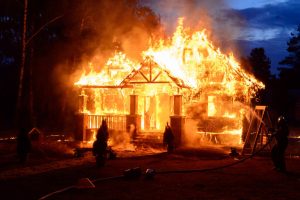Fire insurance serves as a vital safeguard for both homes and businesses, offering financial protection in the unfortunate event of a fire. Fires can result in devastating losses, impacting property, assets, and even livelihoods. This type of insurance ensures that individuals and businesses are not left in financial ruin when recovering from fire-related damage. By covering repair costs, replacement expenses, and associated liabilities, fire insurance provides peace of mind and a pathway to recovery for millions.
How Fire Insurance Policies Work
Fire insurance policies typically cover damages resulting directly from fire, such as the destruction of buildings, furniture, machinery, and personal belongings. Additionally, many policies extend to cover damages caused by smoke, firefighting efforts, or explosions triggered by the fire. However, it’s essential to understand that fire insurance does not cover every scenario. For instance, intentional fires, damages due to negligence, or losses unrelated to the fire may be excluded. Carefully reviewing the terms and conditions outlined in the policy is crucial to ensure full comprehension of what is, and isn’t, covered.
Benefits of Fire Insurance for Homeowners
Homeowners benefit greatly from having fire insurance, as it helps protect one of their most significant investments—their home. Fire insurance covers the cost of repairing or rebuilding a home that has been damaged or destroyed by fire. It also often compensates for lost personal belongings, such as furniture, electronics, and sentimental items, offering financial security during challenging times. Additionally, fire insurance can provide temporary housing expenses if the home is deemed uninhabitable, ensuring homeowners have a safe place to stay while their property is repaired.
Benefits of Fire Insurance for Business Owners
For businesses, fire insurance goes beyond protecting physical spaces. It serves as a shield for entrepreneurs, protecting assets like office supplies, machinery, inventory, and important documents. Some policies also include business interruption insurance, which compensates for income lost while operations are on pause after a fire. This coverage can be the difference between a business recovering successfully or facing permanent closure. Fire insurance ensures that businesses can bounce back and rebuild without excessive financial strain, preserving livelihoods and protecting employees’ jobs.
Factors Affecting Fire Insurance Premiums
While fire insurance offers comprehensive coverage, premiums can vary depending on several factors. The location of the property plays a significant role—areas prone to wildfires or those with limited access to firefighting resources typically come with higher premiums. The age and construction materials of the property also impact costs, as newer and more fire-resistant structures are considered lower risk. Additionally, the use of the property—whether residential or commercial—influences the premium. Other factors, such as the presence of fire alarms, sprinklers, and other safety measures, may lead to discounts, rewarding proactive measures to reduce risk.
Tips for Choosing the Right Fire Insurance Policy
Selecting the right fire insurance policy involves thorough research and careful consideration of individual needs. Start by assessing the property’s exact value and what level of coverage is adequate to protect against potential losses. Compare policies from different insurers to find the one that offers the best blend of affordability and comprehensive coverage. Check for additional features, such as personal property replacement and business interruption coverage, as these can significantly enhance the policy’s effectiveness. Finally, seek clarity from insurance agents about exclusions or any ambiguities before signing the agreement.
Claims Process: What to Do After a Fire
Filing a claim after a fire may seem overwhelming, but understanding the process can make it more manageable. First, notify your insurer immediately and provide preliminary details about the incident. Gather evidence, such as photos and videos of the damage, and prepare a detailed inventory of lost or damaged items. Cooperate fully with the adjuster assigned to the case and ensure that all supporting documents, including repair estimates and receipts, are submitted promptly. Adhering to these steps ensures a smoother claims process, allowing you to recover financial support quickly.
Common Misconceptions About Fire Insurance
Despite its importance, fire insurance is often misunderstood. One common misconception is that ordinary homeowners’ insurance always covers fire damages. While it may provide limited coverage, a standalone fire insurance policy offers much broader protection. Another myth is that fire insurance policies cover loss due to negligence, such as leaving cooking unattended—such scenarios are typically excluded. Some believe that fire insurance is unnecessarily expensive, but when weighed against the potential costs of fire damage, it becomes clear that its value far outweighs the premium costs.
The Future of Fire Insurance: Trends and Predictions
The fire insurance industry is undergoing significant changes, driven by advancements in technology and an evolving risk landscape. Insurers are now using AI and predictive analytics to assess risks more accurately and offer personalized policy recommendations. Climate change—leading to increased occurrences of wildfires—has prompted insurers to adapt their offerings accordingly. Additionally, smart home technology is playing a role in fire prevention, with devices like smoke detectors and fire suppression systems influencing both premiums and claim approvals. As these trends continue, fire insurance is expected to become even more efficient and tailored in addressing customer needs.
Fire Insurance is Indispensable
Whether you’re a homeowner looking to protect your sanctuary or a business owner safeguarding your livelihood, fire insurance is essential. Its ability to cover damages, help rebuild, and provide financial relief during unforeseen crises makes it an indispensable tool in risk management. By understanding your options, selecting the right policy, and staying proactive about fire safety, you can ensure a secure future for your home or business. Discuss with your insurance provider today to safeguard your property and peace of mind.
FAQ
Is fire insurance included in a standard home insurance policy?
While some homeowners’ policies cover fire damage, it might not be comprehensive. A separate fire insurance policy offers broader protection.
Does fire insurance cover wildfires?
Many fire insurance policies cover wildfires, but it’s essential to confirm this with your insurance provider, as coverage can vary by region.
Can businesses deduct fire insurance premiums as a tax expense?
Yes, fire insurance premiums for business properties are generally tax-deductible as part of business expenses.
How long does it take to process a fire insurance claim?
The time frame varies depending on the complexity of the claim and the efficiency of supporting documentation. It’s best to act promptly after an incident.
Can I update my fire insurance policy as my property value changes?
Yes, you should regularly review and update your fire insurance policy to ensure it provides adequate coverage for your property’s current value.




